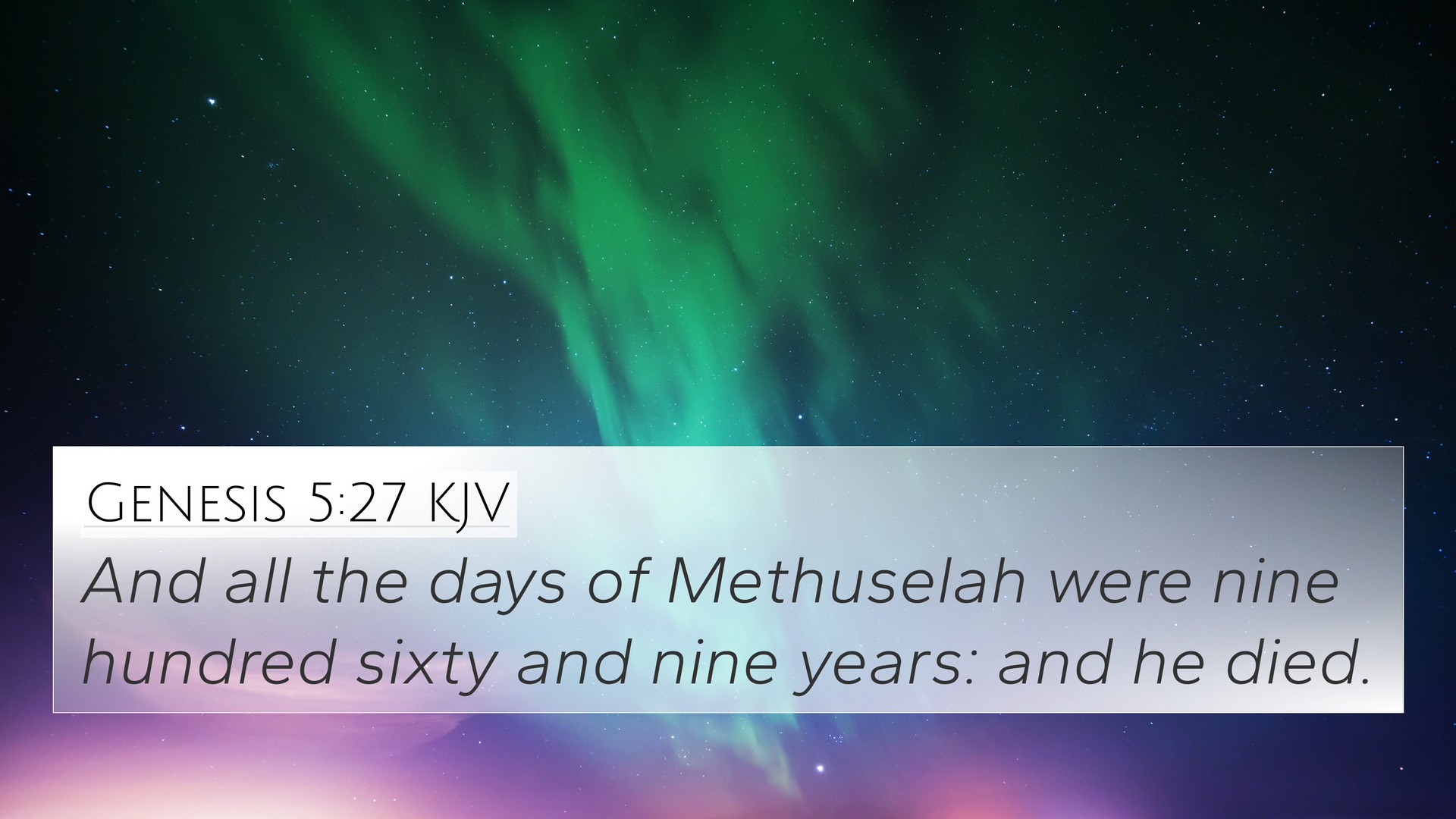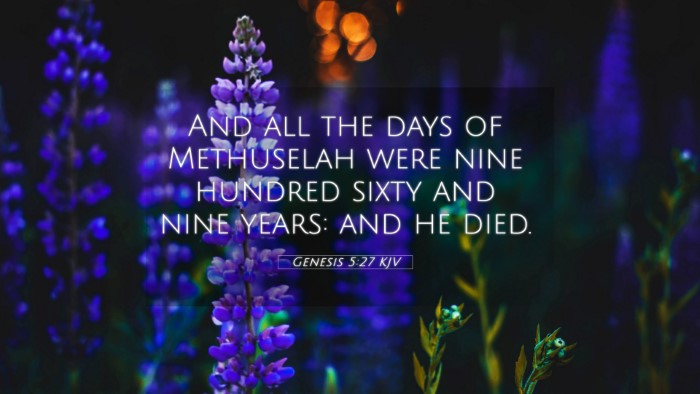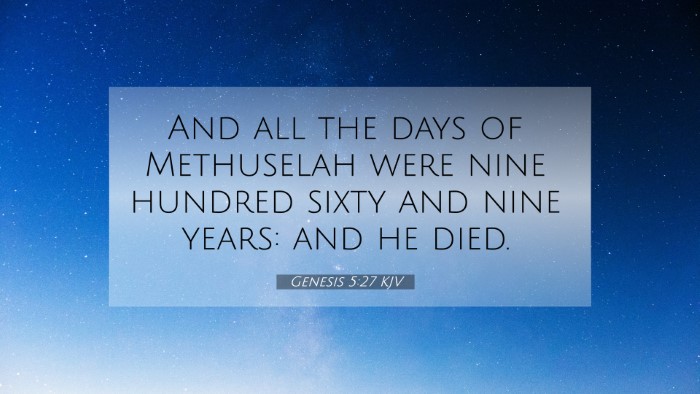Understanding Genesis 5:27
Genesis 5:27 reads: "So all the days of Methuselah were nine hundred sixty-nine years, and he died." This verse, while simple in its presentation, carries profound significance in understanding the themes of life, death, and divine judgment in the biblical narrative. Various commentaries provide insights that enrich our understanding of this passage.
Significance of Methuselah's Age
Matthew Henry notes that Methuselah's lengthy life serves as a testament to the grace of God. His age, 969 years, stands as the longest recorded lifespan in the Bible, which symbolizes both God's mercy in allowing time for repentance and the richness of life before the Flood. Moreover, Methuselah's name means "his death shall bring," hinting at the impending judgment of the Flood, as his death marked the time when God would bring this cataclysm upon the earth.
Albert Barnes emphasizes that Methuselah's long life was a period during which he likely witnessed the moral decline of humanity. His existence spanned generations, and this serves as a vivid reminder of divine patience in the face of sin. The length of Methuselah's life can be seen as a reflection of God's desire for humanity to turn back to Him, offering continuous opportunities for repentance, which possibly makes his life relevant for believers today.
Adam Clarke adds that the mention of Methuselah’s death is significant as it marks a pivotal point in the biblical timeline, leading to the great flood. Clarke suggests that Methuselah serves as a link between the antediluvian world and the world after the Flood, illustrating God's ultimate purposes of judgment and grace. His longevity also reflects the transitional nature of the antediluvian patriarchs, whose lives illustrate the gradual deterioration of human righteousness.
Bible Cross-References
This verse connects with several other biblical passages that explore similar themes of age, judgment, and grace:
- Genesis 6:3 - "And the Lord said, My spirit shall not always strive with man, for that he also is flesh: yet his days shall be an hundred and twenty years." - This verse highlights the reduction in lifespan as a consequence of human sin.
- Genesis 7:10 - "And it came to pass after seven days, that the waters of the flood were upon the earth." - The flood represents the divine judgment that Methuselah’s life foreshadowed.
- Hebrews 11:5 - "By faith Enoch was translated that he should not see death; and was not found, because God had translated him: for before his translation he had this testimony, that he pleased God." - This verse connects Methuselah through his lineage, emphasizing the faith of his father Enoch.
- 2 Peter 3:9 - "The Lord is not slack concerning his promise, as some men count slackness; but is longsuffering to us-ward, not willing that any should perish, but that all should come to repentance." - Echoes God's patience as demonstrated by Methuselah's life span.
- Matthew 24:37-39 - "But as the days of Noah were, so shall also the coming of the Son of man be." - This connects to the context of Methuselah's life and the judgment that was to come.
- Ephesians 2:4-5 - "But God, who is rich in mercy, for his great love wherewith he loved us, even when we were dead in sins, hath quickened us together with Christ." - Highlights God’s grace, paralleling the theme seen in Methuselah’s lengthy life.
- James 1:17 - “Every good gift and every perfect gift is from above, and cometh down from the Father of lights, with whom is no variableness, neither shadow of turning.” - This emphasizes the consistency of God’s nature, paralleling the mercy seen in Methuselah's life.
Thematic Connections
The story of Methuselah is pivotal for understanding the overarching themes of life, death, divine patience, and judgment throughout scripture. Luke 3:37-38 also provides a genealogy that includes Methuselah, linking him to the New Testament and illustrating the continuity of God's plan through generations.
Other relevant themes include the transience of human life, seen in Psalm 90:10: "The days of our years are threescore years and ten; and if by reason of strength they be fourscore years, yet is their strength labor and sorrow; for it is soon cut off, and we fly away." This further emphasizes the fragility of life compared to Methuselah's extended years, highlighting the ultimate fate we all share.
Ecclesiastes 3:1 reinforces that "To everything, there is a season, and a time for every matter under heaven," stressing the importance of recognizing the time that God grants us, urging us to live purposefully during our allotted years, as Methuselah’s long life was a call to heed God's ways.
Conclusion
Genesis 5:27, while a simple accounting of Methuselah's lifespan, embodies a rich complexity worth exploring through the lens of various commentaries. It reflects God's mercy, the theme of judgment, and the interconnectedness of biblical narratives across both testaments. For anyone looking to engage more deeply with the Bible, understanding Genesis 5:27 serves as a stepping stone into a broader exploration of the connections between Bible verses, inviting practitioners into a fuller understanding of God's narrative through scriptural cross-referencing.


